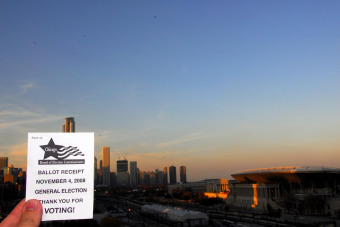Eye on 2010
By Kevin Robinson in News on Apr 14, 2009 2:25PM
2010 may be a wild election year in Illinois. That is, if anyone can make up their minds about what they want to do. 7th District Congressman Danny Davis hopes Roland Burris will make up his mind already about running for re-election. Davis told Chicago Public Radio on Monday that Burris's decision will affect his decision about whether to run for Senate next year. "That would play seriously in the thinking of any African American who may be interested," he said. "I'm hoping that the senator will hurry up and publicly let people know whether he intends to run for election." Well, we already know how Burris is leaning.
While it seems unlikely that Burris will have an easy time winning a full term to the Senate next year, it's also unlikely that anyone other than Alexi Giannoulias will have an easy time getting into that office. Although Giannoulias hasn't officially announced that he's running, he has formed an exploratory committee, and it appears that he has the backing of the state's Senior Senator, Dick Durbin. Durbin brought Giannoulias along with him on an economic development trip to Greece, Turkey and Cyprus earlier this year. That's not exactly par for the course when you're the state treasurer. Congresswoman Jan Schakowsky has also indicated that she's interested in the job, but hasn't gotten the early backing that Alexi has.
Where potential candidates smell blood in the water around Burris, potential candidates for governor are also hoping that Quinn will be weakened next year by his proposal to raise the state income tax to help close the record budget hole. Governor Pat Quinn has made it clear that he intends to try to hold on to his office next year. Attorney General Lisa Madigan, long believed to be fantasizing about her name in lights over toll road signs, may also run against Quinn. Although she's been coy about her plans, she didn't rule out a run during an appearance with Quinn at a bill signing in Chicago. "In terms of my aspirations and the governor's aspirations, we'll probably be making those decisions later on," she told Chicago Public Radio. She also restated her position that she would be reluctant to go along with Quinn's proposal to increase the state income tax to close Illinois's budget hole.
And no race for governor would be complete without at least a handful of Republicans running for the highest office in the state. State Sen. Bill Brady of Bloomington has already announced his intentions to run for governor, kicking off a four-city tour of the state early last month as part of his formal announcement. He took a swing at Quinn in his announcement, "We're asking families and businesses around this state to tighten their belts, live within your means, make due with what you can," said Brady. "And yet government, big government in Illinois, is saying, 'We need more of your money. We need to increase your taxes.' Frankly, this is the worst time of all to be doing that given the economic circumstances." DuPage County Board Chairman Bob Schillerstrom is also making a ruckus about taxes in Illinois, perhaps in anticipation of a run for governor. He's planning on holding his own tax protest this year on April 15, hosting a "Tax Day Speakout" in Downers Grove.
While Democrats chase their tails, trying to decide who's going to announce what, when and why, the state Republican Chairman Andy McKenna is hoping that the upcoming primaries will be less contentious than in years past. "The last gubernatorial primary was not constructive. Donors invested nearly $20 million in that primary and we frankly came out of the primary weaker than we were going in the primary," McKenna said on WGN-AM. "I think a lot of people have looked at that and said, 'If we can, we don't want to repeat that," he said. He's hoping that "where possible, both the Republican organizations and donors are going to try to coalesce around candidates they feel can get the job done," adding that "primaries of themselves aren't bad.... They're bad if they become negative and people use it to try to destroy other candidates."
